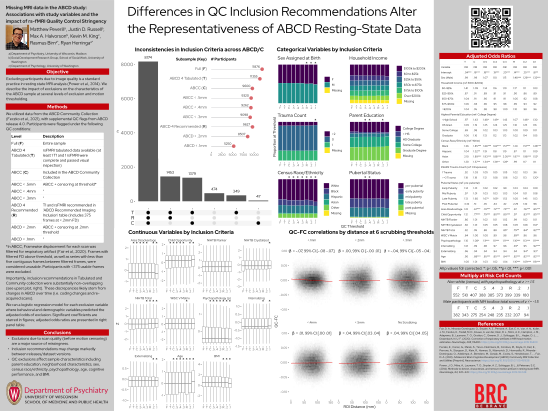Missingness in the ABCD data.
How do QC decisions affect rsfMRI missingness in ABCD?
Preprint
The current version of a preprint of this project can be found on psyarxiv.
Abstract:
Analysis of resting state fMRI (rs-fMRI) typically excludes images substantially degraded by subject motion. These exclusions are more likely in pediatric neuroimaging. Data quality, including motion, has been shown to relate to a broad set of participant characteristics, particularly in pediatric neuroimaging (Cosgrove et al., 2022; Gard et al., 2023; Power et al., 2012). Consequently, when planning quality control (QC) procedures researchers must balance data quality concerns against the possibility of biasing results by eliminating data. We sought to inform this process by investigating how a broad spectrum of participant characteristics in the Adolescent Brain and Cognitive Development (ABCD) study were related to participant inclusion/exclusion across versions of the dataset (the ABCD Community Collection and ABCD Release 4) and QC choices (specifically, motion scrubbing thresholds). We found that a broad spectrum of behavioral, demographic, and health related variables were related to participants’ odds of exclusion at all reasonable levels of motion scrubbing. Our results underscore the need to formally account for missing data when analyzing rs-fMRI data and interpreting results. Additionally, we demonstrate the urgent need for better data acquisition and analysis techniques which minimize the impact of motion on data quality. Finally, we discuss the importance of including detailed information about quality control in open datasets such as ABCD.
Pre-registration
Hypotheses related to this project were pre-registered in: Missing MRI data in the ABCD study: Associations with study variables and the imp act of rs-fMRI motion scrubbing thresholds.
Flux 2023 poster
Feel free to download a copy of the poster here:
Here is a blog post about the reproducible workflow behind the poster.
